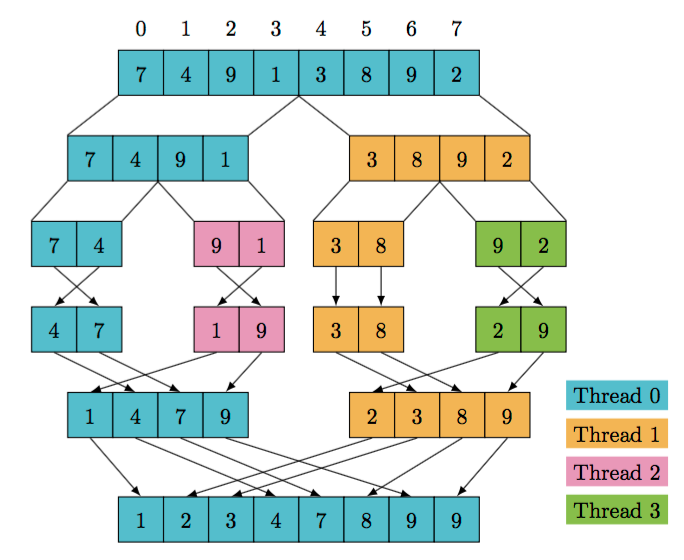Implementation in Rust sequential
use std::thread;
fn evaluate_sequential(k: f64, a: f64, t: f64) -> f64 {
let a = 2.0 * k * a * t;
let b = f64::exp(-a * t * t);
return a * b;
}
Implementation in Rust Parallel
Quite simple because join returns the result of the expression.
use std::thread;
fn evaluate_parallel(k: f64, a: f64, t: f64) -> f64 {
let thread1 = thread::spawn(
|| 2.0 * k * a * t
);
let thread2 = thread::spawn(
|| f64::exp(-a * t * t)
);
let a = thread1.join().unwrap();
let b = thread2.join().unwrap();
return a * b;
}
Implementation in Java
- A little more complex because
joindoesn't return anything. - So we need to simulate that in some way
- Let's inherit from
Threadand add that behaviour
public class MathThread extends Thread {
private final Supplier<Double> expression;
private double result;
public MathThread(Supplier<Double> expression) {
this.expression = expression;
}
public void run() {
// When running the thread save the result
result = expression.get();
}
public double getValue() { return result; }
}
Implementation in Java - Parallel evaluation
double evaluateParallel(double k, double a, double t) throws InterruptedException {
var thread1 = new MathThread(() -> 2* k * a * t);
var thread2 = new MathThread(() -> Math.exp(-a * t * t));
thread1.start(); // Start thread1
thread2.start(); // Start thread2
// Wait for both threads to complete
thread1.join();
thread2.join();
// Now get the values and multiply them
return thread1.getValue() * thread2.getValue();
}
Matrix Operations
Matrix definition
#[derive(Debug, Clone)]
pub struct Matrix(pub Vec<Vec<f64>>);
impl Matrix {
pub fn rows(&self) -> usize { self.0.len() }
pub fn columns(&self) -> usize { self.0[0].len() }
}
Add Matrices
Serial Version
pub fn add_serial(&self, other: &Matrix) -> Matrix {
let rows = self.rows();
let cols = self.columns();
let mut result = Vec::new();
for i in 0..rows {
let mut row = Vec::new();
for j in 0..cols {
row.push(self.0[i][j] + other.0[i][j]);
}
result.push(row);
}
Matrix(result)
}
Using map
pub fn add_serial(&self, other: &Matrix) -> Matrix {
let rows = self.rows();
let cols = self.columns();
let result = (0..rows)
.map(|i|
(0..cols)
.map(|j| self.0[i][j] + other.0[i][j])
.collect()
)
.collect();
Matrix(result)
}
Parallel Version, Row by Row
pub fn add_parallel(&self, other: &Matrix) -> Matrix {
let rows = self.rows();
let cols = self.columns();
thread::scope(|s| {
let threads: Vec<_> = (0..rows)
.map(|i| {
s.spawn(move || {
(0..cols).map(|j| self.0[i][j] + other.0[i][j]).collect()
})
})
.collect();
Matrix(threads.into_iter()
.map(|t| t.join().unwrap())
.collect())
})
}
Merge Sort
Algorithm
- If the array has 1 or fewer elements it's already sorted
- Else:
- Split the array in 2 parts and recursively apply mergesort to each of the parts
- Merge the two already sorted parts
Sequential implementation
pub fn sort(array: &[i32]) -> Vec<i32> {
let len = array.len();
if len <= 1 {
array.to_vec()
}
else {
let x = sort(&array[..len/2]); // <-- array slice
let y = sort(&array[len/2..]);
merge(&x, &y)
}
}
Merge
pub fn merge(first: &[i32], second: &[i32]) -> Vec<i32>{
let mut result = Vec::new();
let mut i = 0; let mut j = 0;
// Merge until one of the inputs is exhausted
while i < first.len() && j < second.len() {
if first[i] <= second[j] {
result.push(first[i]);
i += 1
} else {
result.push(second[j]);
j += 1
}
}
// Copy the remaining items
result.extend_from_slice(&first[i..]);
result.extend_from_slice(&second[j..]);
result
}
Parallel Implementation
- Recursively sort the two halves of the array in parallel
- Sequentially merge the two halves of the array
Parallel Implementation
pub fn sort(array: &[i32]) -> Vec<i32> {
let len = array.len();
if len <= 1 {
array.to_vec()
}
else {
let (first, second) = thread::scope(|s| {
let x = s.spawn(|| sort(&array[..len / 2]));
let y = s.spawn(|| sort(&array[..len / 2]));
(x.join().unwrap(), y.join().unwrap()) // <-- Scope also returns a value
});
merge(&first, &second)
}
}
Parallel implementation - Using fewer threads
Instead of:
{
let x = s.spawn( || sort( & array[..len / 2]));
let y = s.spawn( || sort( & array[..len / 2]));
(x.join().unwrap(), y.join().unwrap())
}
Do:
{
let x = s.spawn(|| sort(&array[..len / 2]));
let y = sort(&array[..len / 2]);
(x.join().unwrap(), y)
});
Merge Sort

The right and the wrong way
Wrong (Why??)
{
let x = s.spawn(|| sort(&array[..len / 2]));
let x_value = x.join().unwrap()
let y_value = sort(&array[..len / 2]);
(x_value, y_value)
});
Right:
{
let x = s.spawn(|| sort(&array[..len / 2]));
let y_value = sort(&array[..len / 2]);
let x_value = x.join().unwrap()
(x_value, y_value)
});
Let's try it
- Bad Result: 9 ms vs 450 ms
- Why?
- Too many Context Switches
- Processor caches: Cache levels, for example:
- L1, L2 & L3
- L1 is private to each core
- L2 & L3 are shared.
Using a limit.
Do not parallelize if the size of the array is below a certain value.
For example if we put a limit of 1000 items:
Serial Sort: 7.172755ms
Parallel Sort: 1.682205ms